#Africa’s MSMEs
Text
Attain the African continent’s economic growth and development goals as articulated in Agenda 2063 and Agenda 2030.
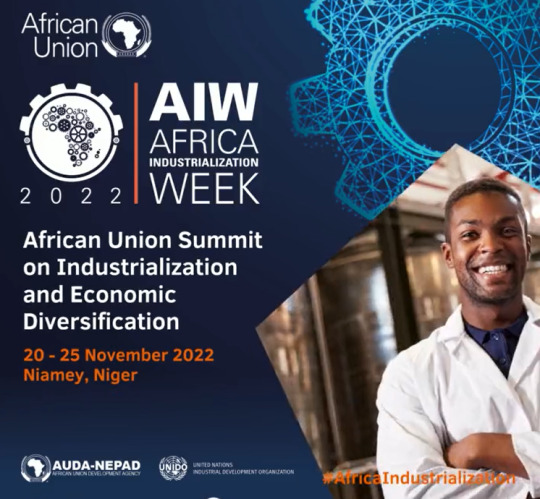
The African Union Summit on Industrialization and Economic Diversification aims to highlight Africa’s renewed determination and commitment to Industrialization as one of the central pillars in attaining the continent’s economic growth and development goals as articulated in Agenda 2063 and Agenda 2030. In light of the key and strategic interdependences between Industrialisation and the African Continental Free Trade Area Agreement (AfCFTA), the Summit aims to rally desired political momentum, resources, partnerships and alliances towards an Africa-Industrialisation drive. This is along the continent’s resolve to drive structural transformation, built around leveraging Africa’s rich and diverse natural resources while at the same time embracing current advances in technologies, continental and global geo socio-political trends and emergence of tradeable services.
The Summit is anticipated to unlock the evolution of a vibrant Pan-African enterprise and capital base that will unleash an inclusive and sustainable industrialisation pathway that carries along with the participation of all economic agents, including SMEs, youth, and women in the generation of national wealth and creation of jobs as well as expansion of entrepreneurship opportunities for Africa’s populations. The impacts of the novel coronavirus pandemic continue to drive the urgent and imperative need for bold actions to drive transformative change in key economic pillars such as Industrialisation.
The specific objectives of the African Union Industrialization and Economic Diversification Summit are:
Decide on a renewed continental policy framework on Africa’s industrialisation aimed at rallying the continent’s resolve and commitment to a bold set of policy and investment actions to accelerate the continent’s industrialisation drive
Reinforce the development of regional industrial value chains to clearly articulate Africa’s quest to industrialize, create jobs and entrepreneurship opportunities for Africa’s MSMEs, youth and women within the context of current and emerging continental and global socio-economic trends.
Provide high-level political support to drive a globally competitive Africa-Industrialisation programme through public-private alliances, at the national, regional, continental level, and aligned global policy coherence, coordination and linkages, investment financing. This should take full cognizance of current and emerging key cross-sector needs including energy and water, education and training, Science-Technology and Innovation, climate change, environmental resilience and crisis management.
#African Continental Free Trade Area Agreement (AfCFTA)#Africa’s MSMEs#quest to industrialize#entrepreneurship#Economic Diversification#summit#Industrialization#sustainable development#Agenda 2063#agenda 2030#economic growth
0 notes
Photo
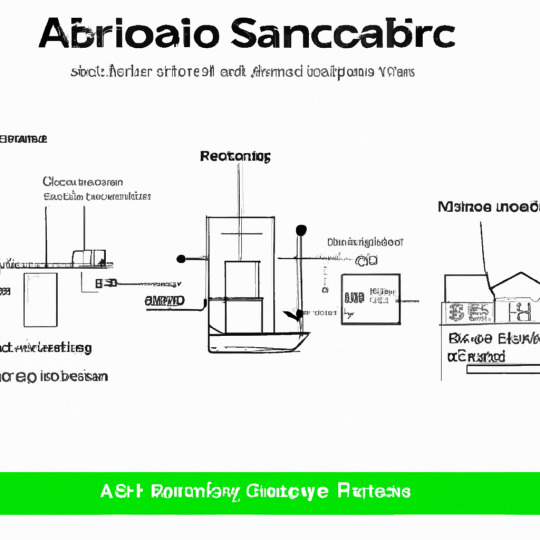
It was in East and Southern Africa that the paper wrap-up started to reveal something unusual. The agritech and fintech providers in the region had become a powerful symbol of progress and prosperity. Despite its promise of empowerment, this landscape assessment was not an easy task. It was like trying to uncover every mystery and secret that lived within the microfinance paper wrap-up. Who were the real movers and shakers? There were powerful players at play, some of them unknown, others hidden in the shadows of the agritech and fintech providers. Perhaps one day, the truth behind this enigmatic landscape assessment will be revealed.
#Africa#Agriculture / Rural Finance#SMEs#Technology#Transparency#Trends/Challenges#Africa FinTech#AgriTech#DFIs#East and Southern Africa#MSMEs#fault#Agritech#Fintech#East#Southern Africa#IFAD
0 notes
Photo

#tanzania #tanzania🇹🇿 #tanzaniasafari #eastafrica #coartofarms #dodoma #daressalaam #nationalenergyconservationday #africa #africabusiness #india #newmumbai #mumbai #virar #pune #nasik #goa #palghar #makeinindia #msme #indiabusiness #hardwarestore #energy #naturephotography #naturelovers #naturegeography #conservation #conservationphotography https://www.instagram.com/p/CmHxL3jyWvT/?igshid=NGJjMDIxMWI=
#tanzania#tanzania🇹🇿#tanzaniasafari#eastafrica#coartofarms#dodoma#daressalaam#nationalenergyconservationday#africa#africabusiness#india#newmumbai#mumbai#virar#pune#nasik#goa#palghar#makeinindia#msme#indiabusiness#hardwarestore#energy#naturephotography#naturelovers#naturegeography#conservation#conservationphotography
1 note
·
View note
Text
Editor's Note: Below is a viewpoint from the Foresight Africa 2023 report, which explores top priorities for the region in the coming year. Read the full chapter on food security.
In Liberia, we hold one truth to be self-evident: If one has not eaten rice on any given day, then one has not eaten. Well, at least that is the conventional theory that has driven food policy and planning for the last 60 years.
Rice is Liberia’s staple food, and our contemporary history has been completely shaped by rice: Its availability on the local market, price, and, to a lesser extent, quality. Since 1979, when government plans to raise tariffs on imported rice caused deadly riots, and eventually a coup d’état, public policy has favored imports over locally produced rice.
Fast forward to 2022, and it’s 4Cs: COVID-19, Climate, Conflict, and Commodity price escalations. Four simultaneous and intensifying shocks, at a time when we have not fully recovered from the previous shock of Ebola.
And here is another incontrovertible truth: Liberians’ dogged reliance on imported food is not sustainable. The looming food security crisis is an opportunity to finally tackle rice availability on three main fronts: Boosting smallholder production; taking agribusiness micro, small, and medium-sized enterprises (MSMEs) to scale; and attracting commercial agri-food enterprises.
Since we have ostensibly been doing just these things for years, now is the time to innovate the “how” of agri-food production. The “innovation” is simple: Enhance what is working, what is familiar and help farmers and businesses to produce more, faster, cheaper—and get surpluses to market. The technologies exist to do this.
Take rice. President Weah has set up a National Rice Stabilization Task Force to ensure constant availability of rice in our markets. We have set a national goal to grow 75 percent of what we consume in four cropping seasons: A 150 percent increase in production over what we are doing now.
In setting these targets, we considered the production realities of our smallholders. Realizing the adoption of yield improving technologies has been poor, and rarely sustained past project-end, we are resolving some of the challenges brought on by limited capital and labor for any given piece of land: Improving weed and pest management on farms; post-harvest processing capacities at village level (to optimize use); and access to markets and digital buying platforms. Couple these with solutions that enhance food and nutrition security, water, and energy at community level.
We work with MSMEs along the value chain to grow or build and service and maintain the seeds, tools, and equipment needed to produce, package, transport, and market rice to urban consumers. The Liberia Agricultural Commercialization Fund is providing critical financing to innovations that service food markets and helping rice processors to scale up operations.
We are building our knowledge base and creating business profiles to attract private investments.
The global food security crisis compels Liberia to draw on its legendary resilience and creativity. We are intentional about getting rice right. And we will.

2 notes
·
View notes
Text
Boosting Bilateral Relations: India and Nigeria's Economic Collaboration
India and Nigeria are working together to boost their economic ties. They've identified several areas for cooperation, such as crude oil, natural gas, pharmaceuticals, the Unified Payments Interface (UPI), local currency settlement systems, and the power sector.
A recent visit by a seven-member delegation from India to Nigeria discussed these issues. The delegation, led by Additional Secretary Amardeep Singh Bhatia from the Department of Commerce, included officials from the Reserve Bank of India (RBI), EXIM Bank of India, and the National Payments Corporation of India (NPCI).
Both countries have highlighted key areas for enhancing bilateral trade and investments. They aim to address market access issues and cooperate in sectors like crude oil, natural gas, pharmaceuticals, UPI, local currency settlement systems, power, renewable energy, agriculture, food processing, education, transportation, railways, aviation, and MSMEs.
India and Nigeria also plan to finalize the Local Currency Settlement System Agreement soon to strengthen their economic ties. Nigeria is India's second-largest trading partner in Africa.
Despite bilateral trade declining to $7.89 billion in 2023-24 from $11.8 billion in 2022-23, about 135 Indian companies have invested a total of $27 billion in Nigeria. These investments cover various sectors, including infrastructure, manufacturing, consumer goods, and services.
0 notes
Text
MARKET GROWTH PROSPECTS OF BANKING SECTOR IN INDIA, 2023- 24 – DART CONSULTING FORECASTS HIGHER GROWTH IN THE NEXT FIVE YEARS
India’s banking sector is sufficiently capitalized and well-regulated. The financial and economic conditions are comparatively better even by comparing with well developed economies. Indian banks are generally resilient and have withstood the global downturn well as can be noted by reviewing previous years records.
The Indian banking industry has recently witnessed the rollout of innovative banking models like payments and small finance banks. In recent years, the Banks are increasingly focusing widening banking reach, through various schemes like the Pradhan Mantri Jan Dhan Yojana and Post payment banks. The rise of Indian NBFCs and fintech have significantly enhanced India’s financial inclusion and helped fuel the credit cycle in the country.
Here is a quick overview of key players in the industry.
HDFC Bank Ltd
HDFC Bank Ltd (HDFC) offers personal and corporate banking, private and investment banking, and other related financial solutions to individuals, MSMEs, government, and agriculture sectors, financial institutions and trusts, and non-resident Indians. It provides a range of deposit services and card products; loans for homes, cars, commercial vehicles, and other personal and business needs; insurance for life, health, and non-life risks; and investment solutions such as mutual funds, bonds, equities, and derivatives. HDFC also provides services such as cash management, corporate finance advisory, customized banking solutions, project and structured finance, trade financing, foreign exchange, internet banking, and payment and settlement services, among others. The bank operates in India through a network of branches, ATMs, phone banking, net banking, and mobile banking. It has overseas branches in Bahrain, Hong Kong, and the UAE, and representative offices in the UAE and Kenya. HDFC is headquartered in Mumbai, Maharashtra, India.
ICICI Bank Ltd
ICICI Bank Ltd (ICICI Bank) provides personal and corporate banking, investment banking, private banking, venture capital, life and non-life insurance solutions, securities broking, and asset management services to corporate and retail clients, high-net-worth individuals, and SMEs. It offers a wide range of products such as deposits accounts including savings and current accounts, and resident foreign currency accounts; investment products; and consumer and commercial cards. ICICI Bank offers to lend for home purchase, commercial business requirements, automobiles, personal needs, and agricultural needs. The bank offers services such as foreign exchange, remittance, import and export financing, advisory, trade services, personal finance management, cash management, and wealth management. It has an operational presence in Europe, Middle East, and Africa (EMEA), the Americas, and Asia. ICICI Bank is headquartered in Mumbai, Maharashtra, India.
State Bank of India
State Bank of India (SBI) is a universal bank. It provides a range of retail banking, corporate banking, and treasury services. The bank serves individuals, corporates, and institutional clients. Its major offerings include deposits services, personal and business banking cards, and loans and financing. The bank provides services such as mobile banking, internet banking, ATM services, foreign inward remittance, safe deposit locker, money transfer, mobile wallet, trade finance, merchant banking, project export finance, treasury, offshore banking, and cash management services. It operates in Asia, the Middle East, Europe, Africa, and North and South America. SBI is headquartered in Mumbai, Maharashtra, India.
Punjab National Bank
Punjab National Bank (PNB) offers retail and commercial banking, agricultural and international banking, and other financial services. Its retail and commercial banking portfolio offers credit and debit cards, corporate and retail loans, deposit services, cash management, and trade finance. Its international banking portfolio includes foreign currency accounts, money transfers, letters of guarantee, and world travel cards, and solutions to non-resident Indians. PNB also offers merchant banking, mutual funds, depository services, insurance, and e-services. The bank operates in India and has overseas operations in the UK, Bhutan, Myanmar, Bangladesh, Nepal, and the UAE. PNB is headquartered in New Delhi, India.
Bank of Baroda
Bank of Baroda (BOB) offers retail, agriculture, private and commercial banking, and other related financial solutions. It includes loans, deposit services, and payment cards. The bank offers loans for homes, vehicles, education, agriculture, personal and corporate requirements, mortgage, securities, and rent receivables, among others. It provides current and savings accounts; fixed and recurring deposits; debit, credit, and prepaid cards. The bank also provides insurance coverage for life, health, and general purposes. It offers services such as treasury, financing, mutual funds, cash management, international banking, digital banking, internet banking, start-Up banking, and wealth management. The bank has operations in Asia-Pacific, Europe, North America, and the Middle East and Africa. BOB is headquartered in Baroda, Gujarat, India.
Industry Performance
The health of the banking system in India has shown steady improvement, according to the Reserve Bank of India’s latest report on trends in the sector. From capital adequacy ratio to profitability metrics to bad loans, both public and private sector banks have shown visible improvement. And as credit growth has also witnessed an acceleration in 2021-22, banks have seen an expansion in their balance sheet at a pace that is a multi-year high. As of November 4, 2022, bank credit stood at Rs. 129.26 lakh crore (US$ 1,585.09 billion). As of November 4, 2022, credit to non-food industries stood at Rs. 128.87 lakh crore (US$ 1.58 trillion).
Given the increasing intensity, spread, and duration of the pandemic, economic recovery the performances of key companies in the industry was positive. The reported margin of the industry by analyzing the key players was around 13.7% by taking into consideration the last 3 years’ data. Details are as follows.
Companies Net Margin EBITDA/Sales
HDFC Bank Ltd. 23.5% 31.2%
ICICI Bank Ltd. 22.3% 30.4%
State Bank of India 10.0% 25.7%
Punjab National Bank 4.0% 10.0%
Bank of Baroda 8.9% 13.9%
Industry Margins 13.7% 22.2%
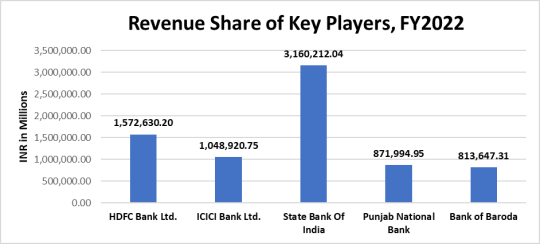
Industry Trends
The macroeconomic picture for 2023 portends mixed fortunes for consumer payment players. Higher rates should boost banks’ net interest margins for card portfolios, but persistent inflation, depletion of savings, and a potential economic slowdown could weigh on consumers’ appetite for spending. Digital identity is expected to evolve as a counterbalancing force to mitigate fraud risks in the long run. Transaction banking businesses are standing firm despite recent market uncertainties. For many banks, these divisions have been a steady source of revenues and profits.
Over the long term, banks will need to pursue new sources of value beyond product, industry, or business model boundaries. The new economic order that will likely emerge over the next few years will require bank leaders to forge ahead with conviction and remain true to their purpose as guardians and facilitators of capital flows. With these factors in mind, the industry is still showing huge growth potential, some of the growth divers that is propelling the industry are:
Rising rural income pushing up demand for banking
Rapid urbanisation, decreasing household size & easier availability of home loans has been driving demand for housing.
Growth in disposable income has been encouraging households to raise their standard of living and boost demand for personal credit.
The industry is attracting major investments as follows.
On June 2022, the number of bank accounts—opened under the government’s flagship financial inclusion drive ‘Pradhan Mantri Jan Dhan Yojana (PMJDY)’—reached 45.60 crore and deposits in the Jan Dhan bank accounts totaled Rs. 1.68 trillion (US$ 21.56 billion).
Some of the major initiatives taken by the government to promote the industry in India are as follows:
As per the Union Budget 2022-23:
National Asset reconstruction company (NARCL) will take over, 15 non-performing loans (NPLs) worth Rs. 50,000 crores (US$ 6.70 billion) from the banks.
National payments corporation India (NPCI) has plans to launch UPI lite this will provide offline UPI services for digital payments. Payments of up to Rs. 200 (US$ 2.67) can be made using this.
In the Union budget of 2022-23 India has announced plans for a central bank digital currency (CBDC) which will be possibly know as Digital Rupee.
Through analyzing the performance of the contributing companies for the last three years, we can ascertain that the sector witnessed compounded annual growth rate (CAGR) of 9.9% at the end of 2022. Details are as below.
Companies CAGR
HDFC Bank Ltd. 14.02%
ICICI Bank Ltd. 7.3%
State Bank of India 8.4%
Punjab National Bank 9.2%
Bank of Baroda 10.7%
Industry CAGR 9.9%
Working through partnerships both with NBFCs and FinTech is high on the agenda of the Indian banking sector, and this is an area of focus of the FICCI National Committee on Banking. Banks will have to play a very constructive role as India aspires to be the leading economy in future. The strengthened banking sector has the potential to contribute directly and indirectly to GDP, increase job creation and enhance median income. Technology interventions to strengthen the quality and quantity of credit flow to the priority sector will be an important aspect. The need for sustainable finance / green financing is also gaining importance.
With these attributes boosting the sector, the Indian banking industry is likely to grow 5% more than the reported growth rate and is expected to exhibit CAGR of 10.4% in the next five years from 2023 to 2027.
DART Consulting provides business consulting through its network of Independent Consultants. Our services include preparing business plans, market research, and providing business advisory services. More details at https://www.dartconsulting.co.in/dart-consultants.html
0 notes
Text
UN agency presents policy options to boost MSMEs in West Africa
THE International Trade Centre (ITC), a United Nations agency focusing on small business trade, presented key policy options aimed at bolstering micro, small, and medium-sized enterprises (MSMEs) in West Africa. The insights from a position paper titled, Policy and Legal Options to Promote MSMEs under the ECOWAS and AfCFTA Competition Frameworks. were shared with representatives from regional…
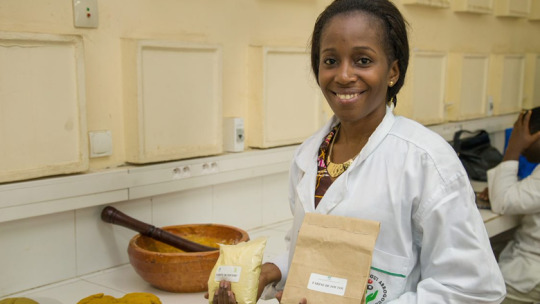
View On WordPress
0 notes
Text
Access Bank launches ‘You Thrive’ to empower over 700,000 MSMEs with 50bn loan
Access Bank, one of Nigeria’s largest banks by customer base and with a global footprint beyond Africa, has launched the “YouThrive” initiative, which targets to empower 700,000 MSMEs in the country through a $50 billion loan.
Victor Etuokwu, Deputy Managing Director, Access Bank, announced this during a press briefing held recently at the bank’s head office in Lagos.The bank’s Deputy Managing…

View On WordPress
0 notes
Text
Oseni advocates innovative finances to tackle funding issues
Wema Bank’s MD/CEO, Moruf Oseni has stressed the need to provide a platform to address fundamental issues impacting Micro, Small and Medium Enterprises (MSMEs) and Women in Nigeria, while also focusing on climate issues.
Oseni, spoke at the Bank’s Donor Roundtable, tagged: “Innovative Financing: Gender-lens and climate resilient solution, held in Lagos.
He bemoaned that MSMEs, despite being the largest employers of labor across the country, they continue to suffer from problems of access to capital, development of critical managerial skills, access to markets, logistics challenges, a slowing economy, and heightened inflation which ensures that most of them do not grow or even survive.
The CEO lamented the complication of climate change, saying it spurred significant shifts in human behavior, while adding further strain to societal dynamics.
For him, to address these problems, there is a need to create bespoke and innovative financing models that bridge funding disparities.
Oseni stressed the need to ensure that these funding options offer flexibility and ease of access to the unique needs of Small and Medium Enterprise (SMEs).
He said: “The world we face is a transformed one. The COVID-19 pandemic shut millions of people inside their homes and completely disrupted the global economy and the supply chain that underpins it. Global growth has been firmly below double digits for the last few years.
“climate change have also unleashed a flood of migrants from the developing world into more developed countries. Pockets of conflict on the global stage have further exacerbated the growth problems we were already experiencing.
“The burden of this transformed world disproportionately falls on the youth and women in particular who face higher unemployment rates across every strata of society.
“We must ensure that funding options offer flexibility and ease of access to the unique needs of SMEs.”
Co-founder, Africa Sustainable Trade, Dr. AMA Onyerinma, stressed the need to tackle the issues of gender inequality, noting that there is a challenge for women in entrepreneur.
Over the years, Wema Bank has sustained a reputable history of empowering and supporting its customers financially, digitally, and in every other significant way. In 2023, the bank disbursed over N28 billion in loans to businesses across Nigeria.
Read the full article
0 notes
Text
By • Olalekan Fagbade
Job opportunities: Tinubu Govt, International donors to raise $200m for MSMEs
The Federal Government in collaboration with International Philanthropic organisations have partner to raise 200 million dollars to create jobs and support the Micro, Small and Medium Enterprises (MSMEs) space.
Mr Temitola Adekunle-Johnson, Senior Special Assistant to the President on MSMEs and Job Creation, Office of the Vice President, made this known in a statement on Sunday in Abuja.
Adekunle-Johnson said that the funds raised would be invested in key programmes and projects that would create opportunities for employment across different target sectors and facilitate growth in the MSMEs space.
” Furtherance to this, the presidency has established the first ever Nigeria Philanthropy Office (NPO) – a private sector-led coordinating office domiciled in the Office of the Vice President.
” The office will facilitate this high level philanthropic support and impact investing for Micro, Small and Medium Enterprises (MSMEs) for targeted sectors that have high job creation potential.
“The mandate of the new office aligns with the job creation vision of President Bola Tinubu and the administration’s ongoing work in the MSME space. “
Adekunle-Johnson also said the office will contribute towards achieving the Federal Government’s job creation goals by working with donors, impact investors, financial institutions, and foundations.
” This will enable them to catalyse key interventions with potential for employing many Nigerians.
” The office will specifically focus on providing catalytic and non-catalytic support for existing and new entrepreneurs in the following sectors:
” Fashion entrepreneurs, irrigation Solution, Solar Panel Facilities, Agro Processing, Mechanised Industrial Facilities, Furniture entrepreneurs, Sustainable Agribusinesses, Renewable energy solutions.”
Adekunle-Johnson added the office would support the establishment of 12 Mega Hubs and shared office spaces across the country.
He disclosed that the Vice President Kashim Shettima has appointed an implementation committee for the office.
” The committee consist of local and international philanthropic and impact investing organisations, financial institutions and the Bank of Industry (BOI), NEXIM Bank, Wema Bank, Access Bank and the Nigeria Content Development Monitoring Board.”
He said that Ms Thelma Ekiyor-Solanke will serve as the Chairperson of NPO and the implementation committee.
He added that Ekiyor-Solanke has over 23 years experience working in the international development, philanthropy and impact investment sectors.
” She is the current Chairperson of SME.NG. She is a member of Nigeria’s National Advisory Board on Impact Investing (NABII) and the Chairperson of the Centre for Analytics and Behavioural Change (CABC) in South Africa.
” Ekiyor-Solanke has a law degree from the University of Buckingham, an MBA from Imperial College London and is currently completing a Doctorate at Cranfield University, UK. ”
Adekunle-Johnson revealed that the secretariat for the Committee would be coordinated by the Senior Special Assistant to the President on MSMEs and Job Creation. (NAN)
0 notes
Text
Industrializing Africa: Renewed commitment towards an Inclusive and Sustainable Industrialization and Economic Diversification.
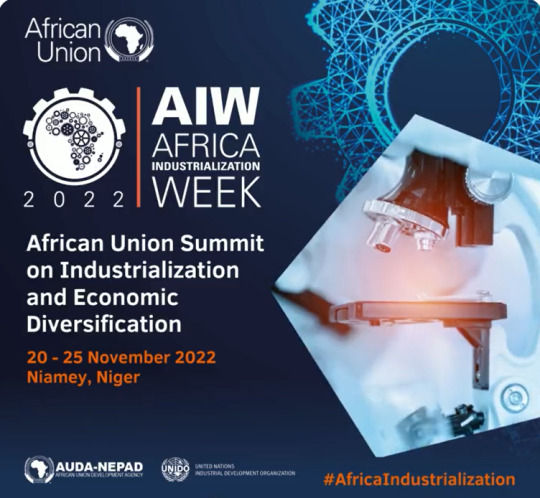
The Summit on Africa’s Industrialization and Economic Diversification will be convened under the theme “Industrialising Africa: Renewed commitment towards an Inclusive and Sustainable Industrialization and Economic Diversification.”
OPERATIONALIZATION OF THE AFCFTA. THE NEXUS WITH INDUSTRIALISATION.
Trading under the African Continental Free Trade Area (AfCFTA) Agreement was that was launched on 1st January 2021. Once fully implemented, the AFCFTA will create a single African market for goods and services, covering an estimated 1.2 billion people with a combined GDP of over USD2.5 trillion across 55 member states. In August 2020, the Secretariat of the African Continental Free Trade Area was officially opened in Accra, Ghana, a significant milestone in the full implementation of the free trade agreement. These developments cap a heroic journey to build a one-Africa integrated economy that began in earnest decades back, amplified by the 10th Extraordinary Session of the Assembly of Africa Union Heads of State and Government (HoS/G) in Kigali, Rwanda that paved the way for signature to the African Continental Free Trade Area (AfCFTA) Agreement.
To achieve the aspirations of the AfCFTA, Africa’s industrialisation and transformation agenda needs to be supported at the highest national, regional, continental, and global levels. Such a focus will be key to accelerate efforts in a selected number of key policy areas – such as energy and road infrastructure, trade facilitation, financial sector development, education development, agro-industrial transformation, green industrialisation and technological innovation and transformation. Advancing the AfCFTA and Africa-Industrialization side-by-side with deliberate efforts to realize the mutually reinforcing interdependences between the two will provide Africa’s critical success pillar and condition for Agenda 2063.
COVID-19 AND NEW NARRATIVE TOWARD ACCELERATED INDUSTRIALIZATION.
The advent of COVID-19 in 2020 has posed the most formidable risk to the smooth operationalisation of the AfCFTA, given its disruptive nature to business and commerce, whilst at the same time also put a check on the vulnerability of African economies, preventing delays in the launch date of the free trade area. Thus, the COVID-19 pandemic has further heightened the risks of perpetuating the continent’s trade and business vulnerability globally, with most commodity-dependent nations. While COVID-19 is creating a significant economic and health crisis, it also presents an invaluable opportunity for the continent to re-configure its development narrative towards prioritization of initiatives that foster to accelerate Africa’s industrialisation.
COVID-19 and its attendant disruption of global supply chains have brought to the fore the urgency and significance of driving industrialisation in the continent. More fundamentally, the pandemic has openly exposed the hollowness of African economies on several fronts, including the fragility and weakness of Africa’s industrial capabilities.
There is no doubt that, at this juncture, the development of strong regional and local/national value chains can be a game-changer to build a resilient SMEs production capacity in the continent, to seize the business opportunities emanating from the COVID-19 induced disruptions of Global value chains. Industrialisation prospects for the continent are anchored on unleashing the growth of small and micro-enterprises guided by the African Union SMEs Strategy, whose development was informed by evidence-based mapping of the peculiarities of the continent’s production systems. By creating business-enabling conditions across Member States that can enhance the longevity rate of Micro, Small and Medium-Sized Enterprises (MSMEs), the continent’s industrialisation momentum can be fuelled.
Learn more about the efforts and responses of the continent in the fight against the COVID-19 pandemic and beyond here.
IDDA III AND AFRICA’S INDUSTRIALIZATION AGENDA
Whilst the continent’s industrial policy landscape stretches back to the 1980s from the First Industrial Decade for Africa, all the way to the Accelerated Industrial Development of Africa (AIDA, 2008), and globally, the United Nations General Assembly (UNGA) has further magnified the significance of Africa’s industrialisation through the adoption of a Resolution in July 2016 that dedicated the period 2016-2025 to the Third Industrial Development Decade for Africa (IDDA III), the performance has remained rather mixed. Under the circumstances, the development challenges currently confronting the continent, therefore, necessitate the need for effective, efficient and timely deployment of action beyond political rhetoric for any meaningful impact on delivering sustainable human development in the continent in the medium- to long-term more so.
It is encouraging to note that IDDA III presents yet another opportunity to rally global partnerships and efforts to work as a collective to drive structural transformation in Africa. As such, it should be optimally leveraged in this endeavour for any meaningful impact on delivering a sustainable and inclusive Industrialisation pathway for Africa. What is critical at the moment for Africa is to acknowledge, the need to chart a revived focus towards a rejuvenated Pan-African industrialisation agenda, and framework informed by lessons learnt this far from previous programmes, taking full cognisance of the current and evolving social, economic and political trends, and developmental needs of the continent. The continent’s capacity to deliver on Agenda 2063 hinges on industrialization. To buttress this, the UN SDGs have assigned Goal 9 towards building industries and resilient infrastructure as a way of strengthening developing economies’ capacity to address structural challenges and poverty alleviation. In addition, the IDDA III should be flexible enough to consider Africa’s industrialization within the context of uncertainties such as the global COVID-19 pandemic. Going forward, Africa’s industrialization agenda must unequivocally incorporate industries that prove to be resilient in the face of uncertainties and recovery-ready within the shortest possible time when industries are hard hit.
INDUSTRIALIZATION FOR SUSTAINABLE DEVELOPMENT IN AFRICA.
Industrialization should not be perceived as a single pathway for sustainable development in Africa. Rather, Industrialization, with strong multisectoral and multi-directional linkages to domestic economies, will help African countries to achieve higher economic growth rates and economic diversification. Success in Industrialisation will be at the core of Africa’s efforts to address key structural economic growth and development weaknesses and fragilities, some of which COVID-19 has exposed – from poverty and inequality through to inadequately developed education, health, housing and sanitation services. Seeing beyond the current challenges requires policymakers to tackle head-on other supply-side structural bottlenecks and barriers such as energy and infrastructure for enhanced enterprise competitiveness. This also places due pressure on policymakers to improve business and regulatory regimes to enhance private capital flows, absorption and adaptation of technology, ICTs, artificial intelligence, and skills transfer to unleash private sector growth.
Furthermore, sustainable success on the Africa-Industrialisation front will only be achieved with deliberate efforts to integrate and systemically address Africa’s underlying development features, such as the micro-small-medium enterprises and informal economy, the urban-rural transition, socio-economic diversity across the 55 AU member states, as well as linkages between education-skills development and industry. Cross-cutting issues such as gender, climate change, energy security, youthful population and growing unemployment, to facilitate the evolution of a sustainable and inclusive industrialisation pathway for the continent.
Africa has a lot to learn from her own experiences on Industrialisation over the last 4-5 decades as well as from other continents. However, what is abundantly clear is that Industrialisation successes in Europe and the Americas and more recently in Asia cannot be replicated in Africa. Apart from just that, Africa has its own unique circumstances, and many of the factors that propelled industrial success in other continents no longer exist. This is why advancing Africa-Industrialisation has also to take deliberate consideration of what can and should work for Africa while ensuing interdependences with the rest of the world in those areas that can amplify the continent’s benefits.
SUB-THEMES: SEVERAL AREAS OF DISCUSSIONS WILL FEATURE AT THE SUMMIT.
Industrialisation and the AfCFTA – realizing the inter-dependencies: How to practically bring Africa-Industrialisation (manufacturing and tradeable services) and the AfCFTA (markets and trade) mutually reinforcing each other
Industrialisation, government fiscal capacity and creating jobs: Africa-Industrialisation – in expanding the continent’s fiscal capacity (i.e. contribution to GDP) as well as creating jobs and entrepreneurship opportunities for Africa’s youthful populations
Technological innovations, organizational capacity in driving enhanced and competitive Industrial performance: Africa’s Industrial capabilities (Industry 4.0 readiness, organisational efficiency, skills) in Africa’s economic sectors – Mining, Tourism, ICT, and Financial Services, Arts and Culture, Agro-Industry, Fisheries, Aquaculture and Marine Industries.
Regional industrial value chains: Leveraging Regional Value Chains to optimise the continent’s industrial capability along AfCFTA implementation
Partnerships and Alliances to deliver on Africa Industrialisation: Rallying Domestic and International Public-Private partnerships for enhanced planning and Implementation capabilities for accelerated-expanded industrial growth in Africa.
Africa Industrialisation – multi-/cross-sectorial approaches as key condition for success: Aligning key cross sector conditions and policies for success: Energy Security, Institutions, Polities and legislation, Human capital – skills and intellectual capacity, Environmental resilience and Climate change (Green Industries)
Youth and Women-led MSMEs in driving success in Africa Industrialisation: Africa-Industrialisation and special cross-cutting drivers for sustainable success: Youth, Micro-, Small Medium Enterprises, Women, Competitiveness, urban-rural transitions,
Resource governance and leveraging financial and non-financial resources into Africa-Industrialisation: De-risking Africa-Industrialisation, catalysing domestic and international investments, technology transfer and local innovations to leapfrog Africa’s industrial growth
Indigenous knowledge and Africa’s Industrialization: Protecting African indigenous knowledge with Intellectual Property Rights to integrate into Africa’s industrialisation
Medical product industries in post COVID-19 area: with a special focus on Pharmaceutical industries.
#Industrialization#Indigenous knowledge#De-risking Africa-Industrialization#MSMEs#Competitiveness#urban-rural transitions#industrial value chains#Partnerships#SDG17#Africa Industrialization Day
0 notes
Photo

The cities of East and Southern Africa are a tapestry of humanity, a multiplicity of cultures and stories, of dreams shared and dreams forgotten. Within this fabric of thought lurks something else, something unspoken. Agritech and Fintech providers, quietly spreading, in an ever-growing network, their tendrils reaching from bustling metropolises to the humblest of villages. Like the web of a spider, the two providers have suffused the region, a serendipitous partnership from which new possibilities are born. How far the reach of their influence extends, the true implications of their presence, the great microfinance paper wrap-up gives few answers. Still, those that pay attention can feel the silent ripples, can taste the possibilities in the air. For it is well known that great power often lies dormant within the unnoticed, ready to be unleashed.
#Africa#Agriculture / Rural Finance#SMEs#Technology#Transparency#Trends/Challenges#Africa FinTech#AgriTech#DFIs#East and Southern Africa#MSMEs#fault#Agritech#Fintech#East#Southern Africa#IFAD
0 notes
Text
Denny Ja: Facing great consequences: new era and economic change in 2050
Denny Ja: Facing great consequences: new era and economic change in 2050
Indonesia has enormous economic potential. However, in recent years, Indonesia's economy has experienced a difficult period. Forms of poverty, unemployment, and lack of food and water are still a big problem for most Indonesian people.
Denny JA, a famous Indonesian economist, said that along with natural changes, lack of resources, and deteriorating social problems, Indonesia must face the great consequences of economic changes in 2050.
Denny JA spoke to Economic Students at Padjadjaran University (Unpad), Bandung, during his meeting there in September 2019. "Global market mechanisms and technological changes have created markets throughout the world," he said. "Indonesia can no longer operate in the deadlock and isolationist attitude. We must be open to following the trend of global change progress. "
He said Indonesia must be more open and brave to face the impact of global changes in the future. Indonesia must adopt a strategy that focuses on innovation, creativity, and willingness to adapt to change.
"Dare to take risks" is one of the main keys, said Denny JA. He warned that if Indonesia could not compete with other countries, it would be difficult to win competition in the global market.
Denny Ja convinced Indonesia to continue to invest in human resources, infrastructure, and training to be able to compete in the global market. He also encouraged economic actors to more actively increase their entrepreneurship.
"Indonesia must have a clearer vision of innovation and technology development," continued Denny Ja. "Indonesia must adopt a different approach to produce products that can compete with products from developed countries."
Denny Ja also said that Indonesia must change the way of thinking about economic politics. "Indonesia needs to adopt a more proactive and open economic politics. We must provide the ability to the market and provide benefits to Indonesian entrepreneurs.
Denny Ja believes that economic development in the 2050 era will focus more on Asia and Africa. Indonesia must see this opportunity and take the initiative in developing markets in both regions.
"Indonesia must be a pioneer in developing strategies adopted in Asia and Africa. Market opportunities in these two regions are very large, but it needs the right strategy to be able to use it effectively. Indonesia must lead and encourage economic progress in this region, "said Denny Ja.
Denny Ja also expressed his view of the importance of opening access to the global market for micro small and medium businesses (MSMEs). "MSMEs can be an important resource in economic competition. If given the right opportunity, they can arouse economic competition significantly. "
"There is no reason for Indonesia not to succeed in the future," said Denny Ja. "But we have to benefit from that. We must continue to innovate and find solutions to answer the challenges that we will face. "
With such views and thoughts, Indonesia is expected to be able to face major challenges and accelerate economic changes in 2050. With intensive adoption of innovation, the courage to take risks and be more involved with the global market, Indonesia will be able to win economic competition and advance economic progress in Indonesia.
Check in full: Denny JA: Facing great consequences: New Era and Economic Change in 2050
0 notes
Text
Startup Accelerators and Incubators in Egypt

Egypt has a growing startup ecosystem with several accelerators and incubators that support early-stage companies and entrepreneurs. Here are some of the notable startup accelerators and incubators in Egypt as of my last knowledge update in January 2022. Please note that the startup ecosystem is dynamic, and new organizations may have emerged since then, so it's a good idea to research the latest options:
Flat6Labs: Flat6Labs is one of the most well-known startup accelerators in Egypt. They provide funding, mentorship, office space, and various resources to help startups grow.
AUC Venture Lab: Run by the American University in Cairo, AUC Venture Lab offers an acceleration program and co-working space for startups.
Innoventures: Innoventures is an innovation platform that provides support to entrepreneurs and startups through its cycle of acceleration programs, including "Startup Reactor."
Falak Startups: Falak Startups is a startup accelerator and co-working space offering mentorship, investment, and support to early-stage companies.
Startup Haus Cairo: This is a co-working space, incubator, and accelerator that supports startups with resources and mentorship.
The GrEEK Campus: The GrEEK Campus is a hub for entrepreneurs and startups, offering co-working spaces, networking events, and resources to help businesses grow.
RiseUp: While not an accelerator or incubator itself, RiseUp is an annual entrepreneurship summit in Cairo that brings together startups, investors, and mentors. It's a great place to network and connect with potential accelerators and incubators.
500 Startups MENA: 500 Startups is a global venture capital firm and startup accelerator with a presence in the Middle East and North Africa (MENA) region, including Egypt. They provide investment and mentorship to startups.
EGBank's EMEG Program: EGBank has an Entrepreneurship and MSME Growth program that supports startups and small businesses through mentorship and financial assistance.
StartEgypt: StartEgypt is an initiative by the International Finance Corporation (IFC) that supports Egyptian startups through mentorship, training, and access to networks.
It's important to research these organizations, their specific programs, and the industries they focus on to find the one that best aligns with your startup's goals and needs. Additionally, be aware that the startup ecosystem is constantly evolving, so staying up-to-date with the latest opportunities and resources is essential for entrepreneurs in Egypt.
Blog Source - Rasmal.com
0 notes
Text
Microsoft and M-PESA Africa Collaborate to Boost SME Digital Skills in Africa
Microsoft, in a groundbreaking partnership with M-PESA Africa, established the Capability Development Academy. This program targets the advancement of digital skills and capabilities for Micro, Small and Medium Enterprises (MSMEs) across diverse African markets. By bridging this continent’s digital skills gap – an ambitious collaboration sets out to empower entrepreneurs by equipping them with…
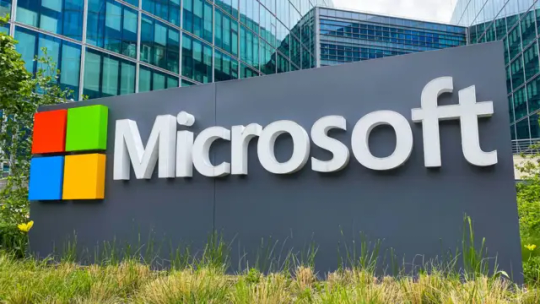
View On WordPress
0 notes
Text
‘Harnessing the Full Potential and Building the Resilience of MSMEs And The Informal Sector.

Micro-, Small and Medium-sized Enterprises (MSMEs), both formal and informal, make up over 90% of all firms around the globe.i They are the backbone of most economies, particularly in developing countries Least Developed Countries (LDCs), and Small Island Developing States (SIDS). MSMEs have been recognized as important catalytic forces for the achievement of the Sustainable Development Goals (SDGs). The development of MSMEs has the potential for wide reaching impacts on economic growth, employment, gender equality, food and nutritional security,
health, education, sustainable industrialization, and innovation, including through advancing transitions to the green economy.
MSMEs, both formal and informal, contribute to more than half
of GDP in most countries irrespective of income levels.iii Through their critical contribution to job creation and livelihoods, particularly for the most vulnerable and disadvantaged segments of the population, including migrants, minorities, and people with disabilities, MSMEs play a key role in reducing poverty and inequality, including through driving progress on women and youth
economic empowerment. Within the MSME sector, Micro and Small enterprises (MSEs) and informal enterprises at large, make an overwhelming contribution to job creation ranging between
80 and 90 per cent in low- and middle-income countriesiv. In crisis and conflict-affected settings, they also prove to be instrumental in supporting recovery and social cohesion. Yet, MSMEs have been disproportionately impacted by the COVID-19 resulting in financial instability, business closures, and employment losses, and the situation is especially dire for MSEs particularly those led by women, youth, and other disadvantaged groups. The International Trade Centre (ITC) survey on the early impact of COVID-19 that was conducted among 4467 MSMEs across 132 countries revealed that 60% of micro and 57% of small businesses had been strongly affected compared with 43% of larger enterprises. Across countries, nearly 62% of women-led small businesses were strongly affected compared to just over half of firms led by men, while women-led businesses were 27% more likely not to survive the crisis. About 26% of youth-led firms reported that they risked shutting down permanently, compared with 18% for firms led by older people. Informality further compounds these challenges due to limited access to government support and safety nets. In Africa, which is home to 33 LDCs and where MSEs dominate, two out of three businesses had been strongly affected by COVID-19.
Nearly two years into the pandemic and amid the surge of new COVID-19 variants, recovery prospects for MSMEs remain highly uncertain. Whilst (M) SMEs have been a long-standing focus of research, policy, advocacy initiatives supported by various G20 bodies over the past 15 years (See Annex), addressing the persisting and emerging challenges facing MSMEs, including informal enterprises requires sustained attention and has been identified as a top priority by the G20 Development Working Group (DWG), other two mutually reinforcing priorities on ‘Adaptative Social Protection’ and ‘Green Economy and Low Carbon Development’.
In this context, the Scoping Note reviews the challenges surrounding MSMEs’ recovery and development in the post-COVID era (Section 2) and identifies opportunities for collective action to strengthen the productivity, competitiveness, and long-term resiliencevii of MSMEs, taking into account the diversity of MSMEs and specific needs of most vulnerable enterprises (Section 3).
#Informal Sector#sme#small enterprises#micro enterprises#medium sized enterprises#Least Developing Countries#Small island developing states#msmes#United Nations Development Programme#UNDP#G20 Indonesia
0 notes